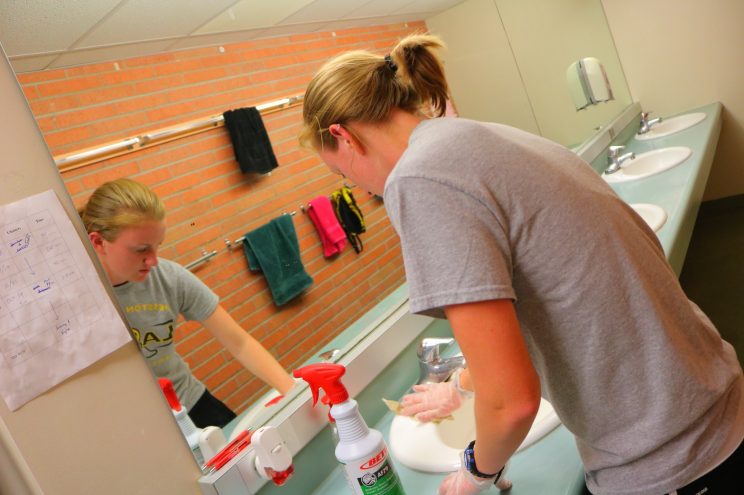Students fight against illnesses in winter
By Risa Fukaya – Horizon News and Feature Editor

Jeff Kauffman’s answer to cleaning the dorms? Get your mod-mates involved. In fact, Kauffman is known for “cleaning parties,” where residents collaborate on tidying the mod and spraying everything down with disinfectant.
And that last step is especially important these days, as temperature and humidity decreases, creating the best conditions for disease-causing germs to thrive.
In a tight-knit community like Hesston, we have endless opportunities to share germs: We have close conversations in and out of classes, we share bathrooms and touch the same handrails. The result: lots of chances to get sick.
Luckily there are many other precautions we can take to avoid getting sick.
Keep your distance.
Stay away from people when you are sick. Make sure to stay out of classes and away from others until your fever is gone for 24 hours without the use of fever-reducing medicine.
If you have roommates, ask them if they can stay in another dorm or with friends until you get well. When you are in good health, keep distance from sick people.
Make your dorm room a disease-free zone.
Sophomore Joy Driver asks residents to use their own hand towels every time they wash. She and John Ebaugh, another sophomore RA, also make it a rule to spray a disinfectant solution on all door handles and wipe down all places that hands touch so disease won’t spread.
Sadie Winter, another RA, agrees.
“Cleaning is one of the biggest ways to keep the residents healthy,” she said. “Especially when we know there is sickness going around, we disinfect door handles, light switches, and the kitchenette and bathroom.”
Other tips: Take showers daily and wash your clothes and sheets frequently.
Wash your hands…carefully.
Hand-washing is key to avoiding sickness and spreading germs. Joy Yoder, professor of nursing at Hesston shared the most effective steps for hand-washing, provided by the Centers for Disease Control and Prevention.
(1) Wet your hands with clean running water and apply soap
(2) Lather your hands by rubbing them together with the soap and remember to lather the back of your hands, between your fingers, and under your nails
(3) Scrub your hands for at least 20 seconds (hum the Happy Birthday song twice)-this is a key step that many people do not scrub long enough and the scrubbing of your hands can decrease the microbes or pathogens (germs) that cause the sickness or disease
(4) Rinse your hands then dry with a clean towel or air dry.
Take care of yourself.
College students are always busy, so getting eight hours a night may not be possible. On such occasions, please try to take naps several times a day. They can be just 20 minutes. You don’t need to sleep in bulk at once. (In fact, you’d be in good company. It is said that Thomas Edison, Napoleon Bonaparte and Leonardo da Vinci divided their sleep into five to six naps a day.)
Yoder says if we want to stay well we need a holistic approach and “small steps” that will create balance.
“Physically, we need to provide our bodies with the best environment for health which includes an active lifestyle, proper nutrition, and allowing our bodies to rest,” she said. “Mentally, we need to take time to reflect, reduce stress, and address those needs where we are noted to be imbalanced. Spiritually, it is important to connect beyond ourselves and allow God to be present with us.”
Practice prevention.
In Japan, gargling is well-known as effective prevention against sickness. Try gargling with green tea and saline solution. Try some of these food options, too: Drink ginger infused water, bulk up on probiotic-rich yogurt as well as protein. Get your Vitamin C with citrus drinks, or take a supplement. Some surprising healthy additions to the list: mushrooms and dark chocolate.


